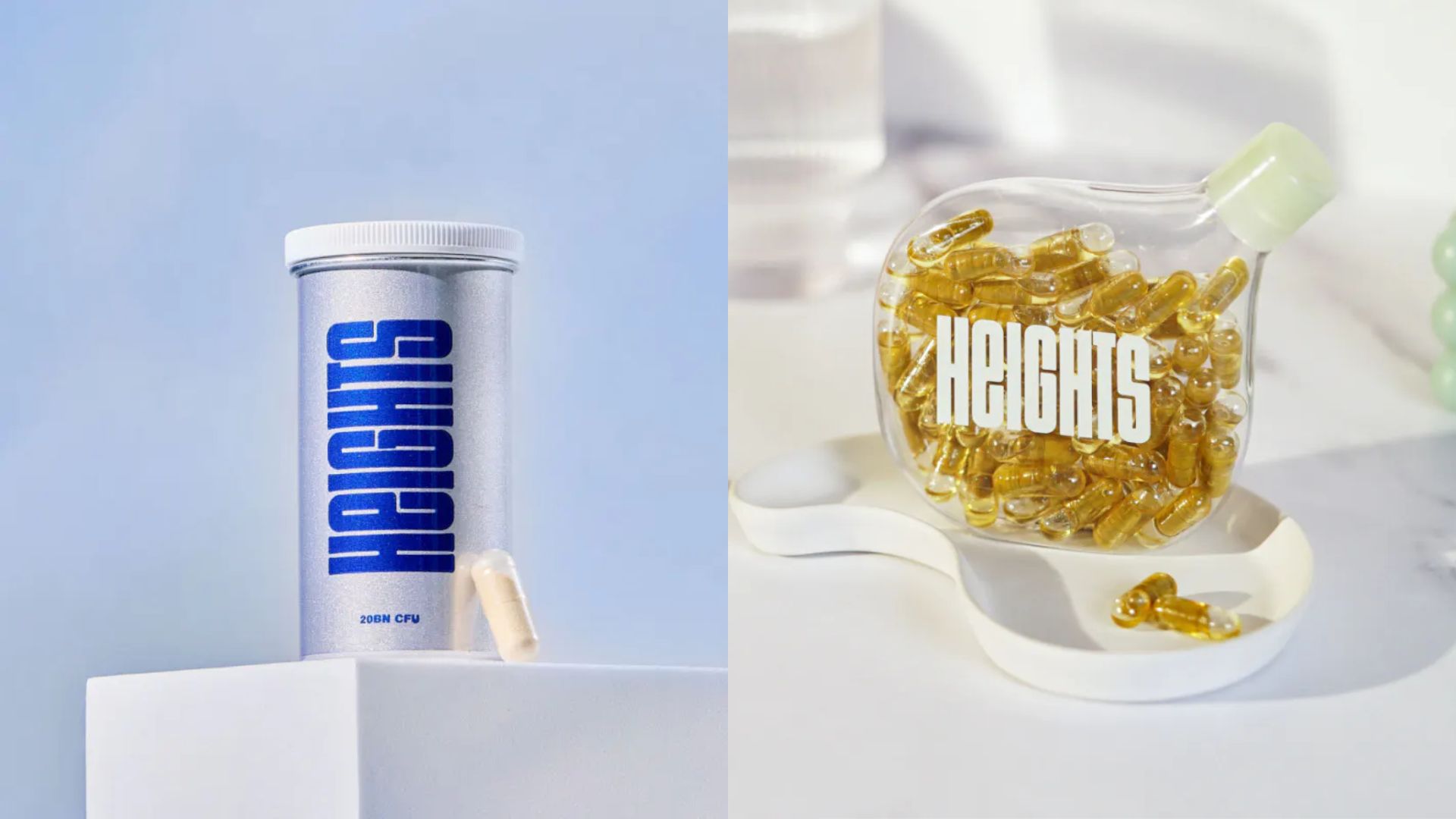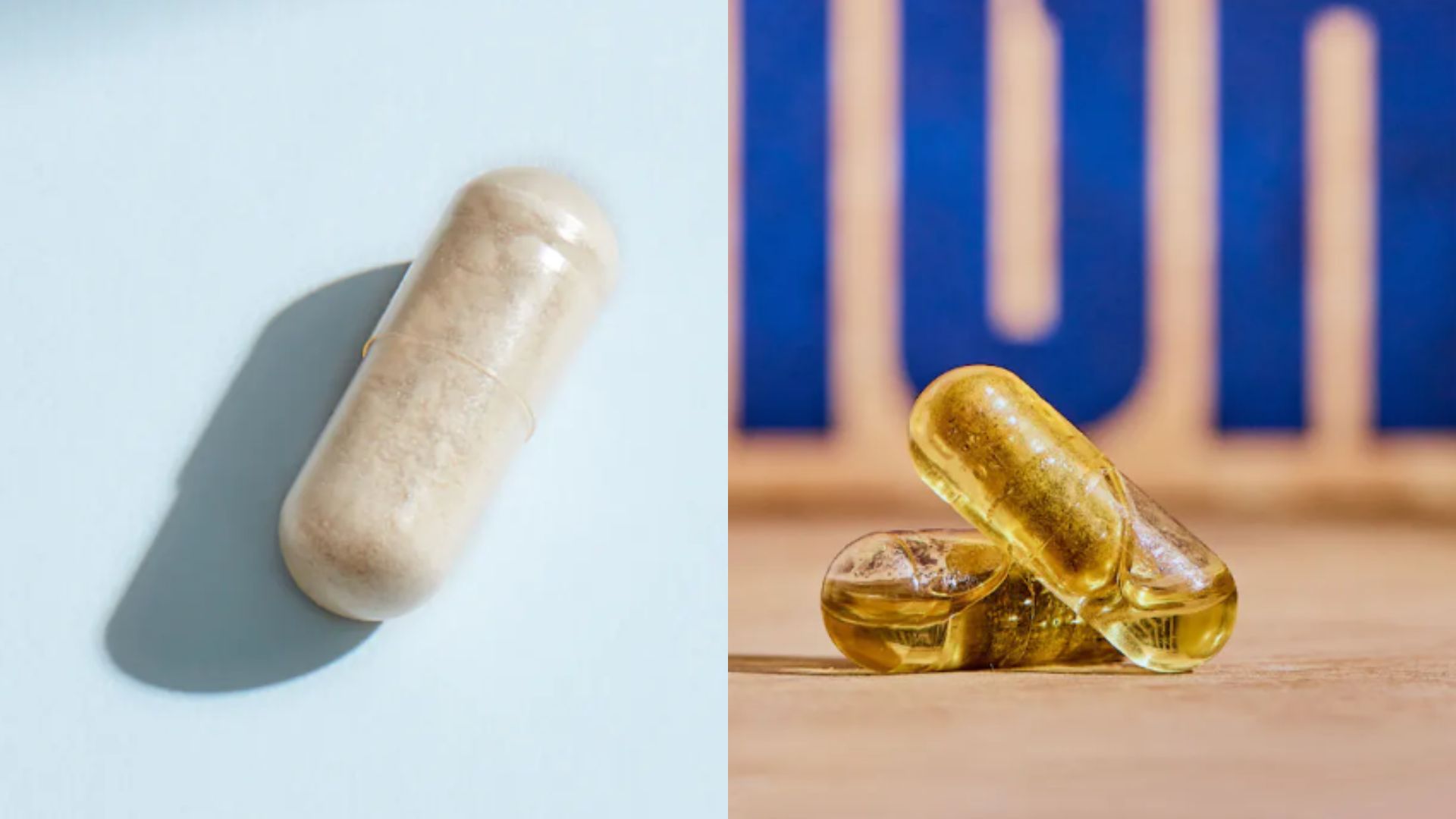Are gut health supplements worth taking? I tried one for a month to see what happened
Writer Samantha Priestley reveals all the benefits she experienced after taking gut health supplements for four weeks, from stronger nails to a better mood


Grace Walsh
The benefits of a healthy gut are only becoming clearer as the years go by with further data and understanding, so it's perhaps no surprise that the market for gut health supplements is booming in 2024.
In the last few weeks alone, M&S have released a 'gut shot' - a combination of kefir yogurt and berries, in collaboration with nutrition and gut health company Zoe, the company led by epidemiologist and doctor Professor Tim Spector. They have become the latest supermarket to truly invest in gut-healthy foods as part of a 'grab and go' range, but brands like Symprove, myota, and Heights have already gained thousands of devoted users. Backed by leading gut health experts, it's these daily probiotic and vitamin supplements that many people just can't get enough of.
Heights is the particular gut health supplement writer Samantha Priestley tried and tested for a month. It was founded by business partners Joel Freeman and Dan Murray-Serter after the two discovered that nutrition was the key to gut health - and overall health by default - after their own health struggles. Now backed by leading scientists and dietitians specialising in gut health, the full bundle includes Vitals⁺ - a 2-capsule collection of 20 vitamins, minerals, healthy fats, and antioxidants - and Biotic⁺ - seven strains of friendly bacteria and zinc in one capsule.
But do these gut health supplements, which are essentially probiotics and so designed to help the 'good' bacteria flourish in the gut, have any benefits for someone not diagnosed with any gut issues? Do they help with any of the causes of bloating? Are they really worth all the attention they've been getting? After testing Heights out for four weeks, these are the benefits (and side effects) Samantha experienced.
Do gut health supplements work?
The results of studies conducted by Heights with Atlas BioMed and Thriva suggest that they do, but I tried the Heights probiotic for a month to find out what kinds of benefits someone without any diagnosed gut issues can expect to find.
1. Probiotics can improve your mood
Most of all, during my month of taking the probiotics, I noticed how much more focused I was at work. Like most people, I tend to scroll social media and I'm easily distracted when I should be concentrating on what I’m doing. After just a couple of weeks of taking the probiotics, I found I was less distracted and could get on with the task at hand without my mind wandering.
I also felt more at ease, less anxious, and calmer. I wondered if it could be a coincidence at first as I hadn't expected to experience these feelings. At the time, I also didn't know that anxiety and gut health were connected.
Sign up to our free daily email for the latest royal and entertainment news, interesting opinion, expert advice on styling and beauty trends, and no-nonsense guides to the health and wellness questions you want answered.
"We have a strong gut-brain connection through the vagus nerve," Anna Mapson, an independent registered nutritional therapist and owner of Goodness Me Nutrition, told me. "And there is some interaction between your gut microbes and the nervous system, sending messages to your brain."
Independent nutritional therapist Marilia Chamon agrees. "The gut can influence your mental health and probiotics may have a positive impact on your mental health by producing neurotransmitters and reducing the inflammation that could be linked to anxiety and depression." It's also one of the reasons why experts encourage those with seasonal affective disorder (SAD) to look after their gut health in winter.
Heights Symbiosis Bundle: £69 per month
Save 14% when you buy Vitals⁺ (which includes 20 nutrients) and Biotic⁺ (live bacteria) in a bundle. The supplement is vegan and there's no need to refrigerate these when in use.

Anna Mapson is a registered nutritional therapist and owner of Goodness Me Nutrition. She is a full member of The British Association of Nutrition & Lifestyle Medicine, which requires her to keep up with professional development and ongoing education. Trained on the use of a low FODMAP diet for IBS by Monash University, she holds a Certificate in Practitioner Skills in Obesity Management from the National Centre for Eating Disorders.
2. Taking probiotics can improve hair and nail growth
Another unexpected - yet obvious - benefit I noticed was the impact of taking Heights on my hair and nails. Over the month, they began to feel stronger and healthier with less brittleness and breakage.
While research on the gut is ever-growing, Mapson suggests the supplement could very well be the cause of this. "There is an emerging gut-brain-skin axis that may be influenced by taking probiotics," she says. "The beneficial bacteria could be communicating with our immune system and changing the way hair or skin grow. Probiotics can also influence the absorption of nutrients in the gut, which could also contribute to stronger nails and hair." That's a win for me.
It's also a benefit that Mapson suggests I would continue to experience if I took the probiotic for longer, with three months being the optimum dosage length to see serious progress. "Hair has a three-month growth cycle so any changes in that area would be more likely to show up after three months, but there is evidence to support the idea that it does have an effect," she says.
Heights isn't just a collection of probiotics though. Along with the seven strains of health gut bacteria, the brand includes a cluster of 20 other vitamins and minerals to promote overall health. So, I asked Sophie Medlin - the brand's head of nutritional research - if there was another ingredient responsible for this dramatic change.
“The Smart Probiotic contains 2.5mg of Zinc Oxide," she tells me. "Zinc is an enzyme of collagen, which supports hair growth and nail strength."

Sophie Medlin is a consultant colorectal dietitian with over 17 years experience in the treatment and management of gut conditions. As well as her clinical work leading the team at CityDietitians she is the Head of Nutritional Research at Heights where she formulates probiotic and vitamin products. Heights is on a mission to bring top quality supplements to the brain health space due to the huge impact nutrition and gut health has on our mental health.

You can buy the Biotic+ (left) and the Vitals+ (right) individually or together.
3. Probiotics can help to reduce gas and bloating
Bloating hasn't ever really been a problem for me, unlike many people who turn to gut health supplements - but I do often experience gas. As I'm sure you can imagine, this can be embarrassing and inconvenient.
After just three weeks of taking the probiotics though, I noticed a real change. Chamon, who is also the founder of Gutfulness Nutrition, says this is because probiotics can help to balance the gut microbiota, which is crucial for good digestion. "They can aid in breaking down food and absorbing nutrients, which helps alleviate digestive issues such as bloating, gas, and irregular bowel movements."
This is the big difference between prebiotics vs probiotics though, says Medlin. "Prebiotic supplements contain food for the good bacteria you already have in your gut," she says, whereas probiotics are the beneficial bacteria we need. "These [prebiotics] are really great if your gut function is good already. If you have poor gut function and symptoms like bloating, gas or diarrhoea, prebiotics are likely to make things worse for you. If this is the case, it’s important to work on improving the types of bacteria you have before you try a prebiotic and work with a dietitian to help manage your symptoms." It may also help to look into the particular foods that cause bloating to see if dietary changes would be beneficial.

Marilia Chamon is a registered nutritional therapist, gut health and IBS expert, and the founder of Gutfulness Nutrition. Marilia has trained on the use of the low FODMAP diet with Monash University and is certified in Applying Functional Medicine in Clinical Practice from the world renowned Institute for Functional Medicine (IFM). Marilia is also a SIBO trained practitioner. Her practice is rooted in science-based nutrition and her advice is based on the latest scientific research
4. Probiotics can be disrupting at first
When it comes to bowel movements, I've always been very regular, which the experts tell me is most important. I go three times a day whereas others only go three times are week - both are fine, it's the consistency that matters. If you're like me and you usually go three times a day and then suddenly you haven't gone for two days, there could be something up.
For me, this was the only concerning element of taking Heights. It had the opposite effect to what I expected in this department. Instead of going three times a day, I was only once a day and my stools were a bit darker and firmer than usual.
Before I started my month of probiotics, Medlin warned me to expect some disruption at first and said that this would settle down in time, so I was in part prepared for a change of some kind.
For those who find themselves constipated or don't go regularly, the effect of gut health supplements on the digestive system can be a benefit. "Taking probiotics can increase your stool mass," says Mapson. "This can create bigger stools, but that can be a good thing because it’s regulating your bowel movements."

Biotic+ (left) comes in its own capsule collection, as does Vitals+ (right).
How do gut health supplements work?
Probiotic supplements contain live bacteria that increase the number of beneficial bacteria in the gut, says Medlin. The gut houses an ecosystem of bacteria, yeasts, and other microbial friends, and they are always working either for us or against us. When the microbial ecosystem is filled with bacterial strains that work to our benefit, via a gut-healthy diet or supplementation, they support the digestion of food, producing useful compounds that reduce inflammation and support our mental health. They also work with our immune system to upregulate or downregulate our immune response.
However, not all gut health supplements were made equal. "The bacterial strains need to be well researched for their benefits and they need to be in a delayed-release capsule, like Heights, to ensure they gut to your gut alive," says Medlin.
This isn't the case for all probiotics. In some, the vital bacteria is no longer alive by the time it reaches the gut, having been killed by acid in the stomach. Heights has been scientifically proven to be 50 times more effective at delivering live and active bacteria to the colon in third-party, independent testing and research.
The bottom line
For me, I found the probiotics largely had the most positive effect on my mood, hair, and nails, and it's for this reason that I've decided to keep taking them. While Heights didn't have a hugely positive impact on my digestive system (apart from reducing gassy incidents), as someone without a diagnosed gut health issue, that's not a problem for me.
But everyone is different when it comes to the ways you can improve your gut health and my experience won't be the same as someone else's. I also only tested the gut health supplements for a month and Heights suggest that the best results come with three months of use.
The experts do have a warning as well: "Probiotics can be a valuable tool in managing specific health conditions and improving overall gut health. However, they should be selected carefully, with attention to the quality and specific strains they contain, and used in the context of an individual's symptoms," says Chamon. For the same reason, many experts warn against other supplements with probiotic ingredients, such as greens powders.
"Ultimately, a balanced and varied high-fibre diet rich in fermented foods, combined with a healthy lifestyle, is the foundation of good gut health," she adds, which means that getting more fibre in your diet could bring about similar benefits in some cases.
"Supplements can play a supportive role but are not a substitute for these fundamental health practices."
Medlin, the head of nutritional research at Heights, also has a warning for those looking to invest in gut health supplements for a diagnosed medical condition like irritable bowel syndrome (IBS). "Think about what you're trying to achieve by taking a gut health supplement," she says, as not all gut health supplements are suitable for everyone.
“People with symptoms of irritable bowel syndrome need to be careful taking prebiotics,” says Dr Medlin. “Those which contain fermentable carbohydrates are likely to make their symptoms worse.” If you're in doubt about what you can do to ease symptoms of IBS, speak to your doctor first.
Samantha is a freelance writer from Yorkshire, writing about health and wellbeing for Woman & Home, Reader's Digest, Giddy, and Good Housekeeping. For the past 15 years, she's combined her personal experiences with reporting, to write about menopause, fitness, sleep, and healthy eating. She also writes about travel and food and drink for The Independent, The Good food Guide, Lonely Planet, Frommer's, and more.
- Grace WalshHealth Channel Editor

